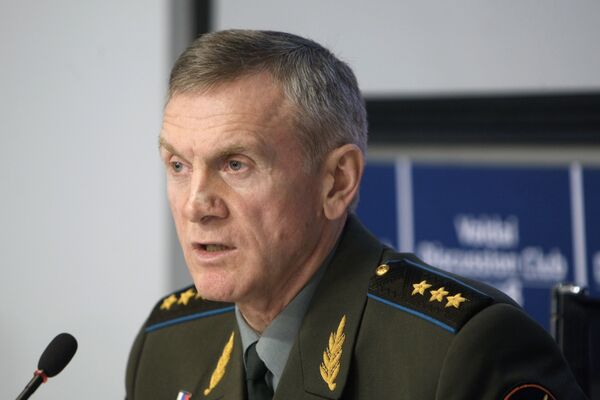MOSCOW, August 7 (RIA Novosti) - At no point during the August 2008 conflict with Georgia did Russia make plans to seize Tbilisi, a deputy chief of the General Staff said Friday.
"There was no task to seize Tbilisi. All tasks to the Russian troops were voiced by the Russian president in his address to the nation and the global community. The form of our actions was a peace enforcing operation," Anatoly Nogovitsyn said during a RIA Novosti roundtable "South Ossetia: a year on."
After repelling Georgian troops from South Ossetia, which had been attacked by Tbilisi late on August 7, Russian forces moved deep into Georgian territory before withdrawing several weeks after the conflict ended.
Russia recognized the independence of both South Ossetia and Abkhazia, another former Georgian republic, on August 24. In response, Tbilisi severed diplomatic ties with Moscow and proclaimed South Ossetia and Abkhazia "occupied territories."
Responding to the Georgian government's publication of a report on "Russia's aggression against Georgia," Nogovitsyn said "declassified documents" released by the Georgian side had been fabricated so Georgian officials could save face before the West.
"Like last year, the signature of Western PR agencies can be seen," he said.
Nogovitsyn also rejected accusations that Russia deployed tanks in Georgian territory beforehand.
"There is not, and cannot be, a single photo that would show our armored columns on the night of August 7. They simply don't exist," he said. "That's why the Georgian side is trying to justify itself with such petty trumped-up forgeries."
Also taking part in the roundtable, the chairman of the Russian lower house committee on the CIS affairs said that none of the world's "key foreign policy players has given its assessment of what happened in August 2008."
"No one has given an assessment of the actions of President Saakashvili, who, regardless of ethnicity, it is absolutely necessary to separate from the Georgian people," Alexei Ostrovsky said.
About 300 people, including President Eduard Kokoity, gathered Friday in Tskhinvali, near the parliament building destroyed by Georgian troops last August for a live linkup between the capitals of North and South Ossetia, Brussels and Moscow.
South Ossetia adopted a statement addressed to the UN Secretary General, the OSCE chairman in office and heads of states, one day before the first anniversary of the start of Georgia's aggression against South Ossetia.
"We have to admit with regret that the international community has still not condemned the actions of the Georgian leadership, which led to numerous human losses, destruction and a catastrophic humanitarian situation in the region," the statement said.
"Besides, with the help of its patrons, Georgia, which lost the war unfolded by its leadership, has almost restored and continues to increase its military potential," the statement said. It also called everyone to "condemn Georgia's armed aggression against South Ossetia's people."
Kokoity said on the issue: "Today no one has been condemned for [Georgia's] actions, and no one has taken responsibility for them. To avoid further consequences, for the August 2008 tragic events in South Ossetia to never repeat anywhere, the international community should condemn both the aggressor and those who armed the aggressor."
He also said the United States and NATO should admit responsibility for what happened, as they continue to arm Tbilisi. "Today in military terms Georgia is even stronger than prior to August 2008," the president of the former Georgian republic said.
South Ossetian Prosecutor General Taimuraz Khugayev said prosecutors had launched criminal proceedings regarding the "genocide" of the Ossetian people. Earlier on Friday, Russian investigators officially reported that 162 residents of the republic died during the war, and 255 were injured. Russia lost 67 troops, including at least 10 peacekeepers.
The head of the Georgian parliament, David Bakradze, said Friday that Russia uses Abkhazia and South Ossetia as a bridgehead for implementation of its imperial ambitions, and that Georgia would continue its struggle until it regained control of both regions.
"For us neither Sukhumi, nor Tskhinvali are a bridgehead - for us they are part of our motherland," he said at an extraordinary parliament session.
Konstantin Kosachyov, the head of Russia's lower house international affairs committee, said during the telelink that Georgian President Mikheil Saakashvili's actions in August 2008 can be qualified as a military crime and a crime against humanity.
"An order was given to bomb peaceful city Tskhinvali. These actions by president Saakashvili... can be investigated only as a crime against humanity," he said, adding that even if Georgia's version is taken into account - that Russian tanks were the first to move toward Georgia in August 2008 - then the Saakashvili regime should have responded with strikes on the military, not on civilians.
Kosachyov also said he hoped the EU report on the Caucasus conflict, due to be ready by September 30, would be objective.




